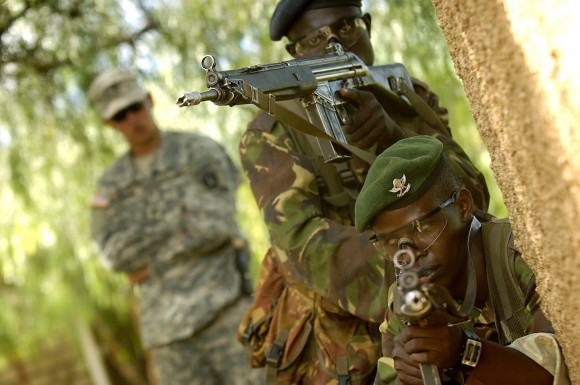
Ever since the onset of the Arab Spring, it has become increasingly difficult for the U.S. to maintain its decades-long policy of support for dictatorial Middle Eastern regimes that obediently conform to U.S. interests, as I wrote more than two years ago. While U.S. support for these regimes hasn’t shifted, cracks have begun to form, as was seen with the Obama administration’s decision this month to withhold some military aid to Egypt.
But as long-standing U.S. towards brutal Middle Eastern regimes begins to adjust due largely to increased awareness, America’s penchant for supporting dictatorship is shifting to Africa. Newly strengthened U.S. allies are sharply intensified domestic repression.
Ever since the country’s disputed elections in 2005, Ethiopia has been a strong U.S. ally, even invading Somalia with Washington’s support in 2006. These years have correlated with harsh crackdowns.
“Ethiopian authorities have subjected political detainees to torture and other ill-treatment at the main detention center in Addis Ababa,” reports Human Rights Watch this month. “Those detained in Maekelawi include scores of opposition politicians, journalists, protest organizers, and alleged supporters of ethnic insurgencies.”
And remember Obama’s unilateral decision back in 2011 to send U.S. troops to Uganda to support the government’s fight against domestic militants? Well, a matter of months into that increased support role, Amnesty International warned that “the Ugandan government and public officials are increasingly placing illegitimate restrictions on freedom of expression and peaceful assembly to silence critical voices.”
Amnesty reported that public protests had been banned and several political activists had been charged with treason, a capital offense.
Increased U.S. military and financial support for the Kenyan government is also correlated with increases in human rights abuses. According to Jonathan Horowitz at Foreign Policy, the U.S. “may rightly be criticized for aiding and abetting human rights violations,” like “detainee abuse, denial of fair trial guarantees, extrajudicial killings, or unlawful extraditions.”
And then, at the end of September, the Obama administration issued blanket waivers exempting three countries from a federal law banning U.S. military aid to countries that use child soldiers. Two of these exempted countries were in the heart of Africa: Chad and South Sudan.
This is all being done under the umbrella of anti-terrorism, but that is an inflated threat and probably not the prime mover of the Pentagon’s shift toward Africa, as I wrote last week.




It is a very sad situation when military service is one of the best options out of poverty, not only in Africa and elsewhere abroad, but also here in the U.S. The men in the photo under supervision of the U.S. "trainer" are earning reliable solid wages as is the trainer, Tyler Meehan. The domestic weapons suppliers are also "winners" in this perpetual scheme. Sometimes the trainee will lose his enthusiasm for threatening and murdering his brethren and leave the U.S. created system — itself a risky business. Once the threshold of bloodlust is implanted in the recruits, the personality is desensitized, unfortunately and a bully outlook dominates. Strictly speaking, there are no winners in this depraved game; only losers. Good job again, Mr. Glaser!
We are stacking up for a greater/new wave of troop deployment to africa.beefing up our position.
Abdelmonem al-Said is the head of the militia that kidnapped Libya’s prime minister last month. He proudly stands by his role in the abduction and defiantly announces in press conferences how not scared he is of retribution or punishment, because the government is too weak, Crisp reports.
The people who have the education and have the knowledge and the skills, those people get the benefits even from the problems of the society and make them as a source of earning.
??? ???????
??? ????????
??? ???
??? ?????
??? ??? ?????
??? ????????
??? ???
???
????? ??
???? ??
????? ????
???? ?? ????
????? ??
????? ??? ?????
????? ?????
????? ???
??? ??????? ??? ???????
??? ?????
??? ?????
??? ?????
??? ?????
??? ?????
??? ?????
???
??? ?????
??? ?????
???
??? ?????
??? ???
??? ??????
??? ???
??? ??
?????? ?????
???
????? ???
??? ????
?????
??
????
???? ?? ????
??
????
???? ????
???????
??????? ?????
??? ?????
??? ?????
??? ???????
??? ??
???? ?? ????
??? ?? ????
??? ???
??? ????
???? ???
??? ????? ?????
??? ???? ?????
??? ???? ?????
??? ?????
??? ???